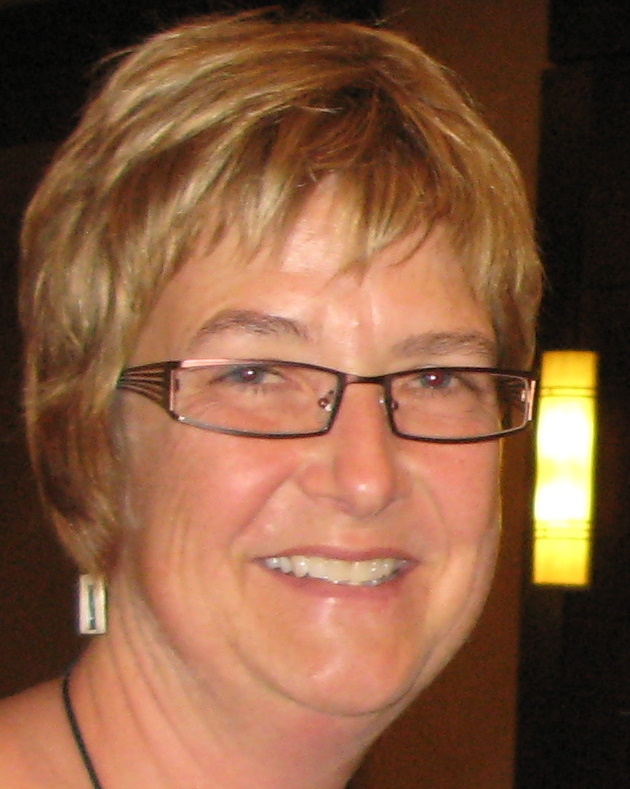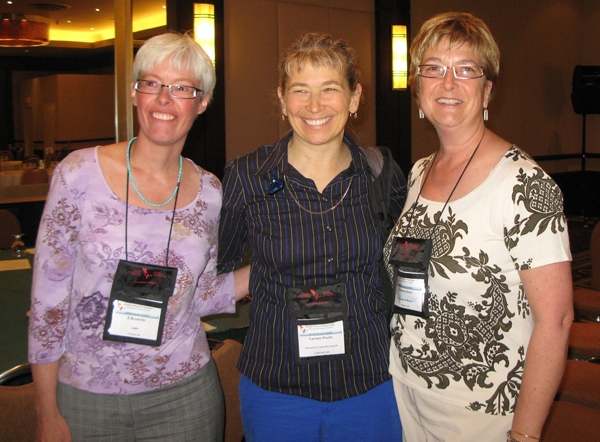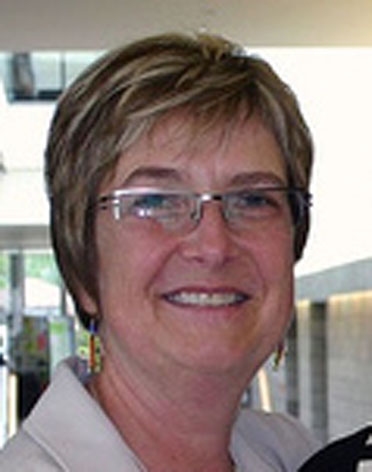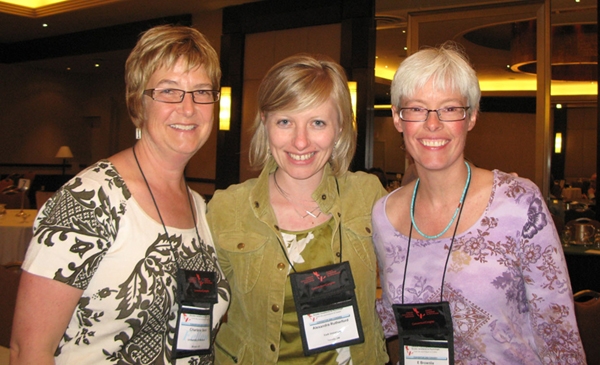Profile

Charlene Senn
Birth:
1960
Training Location(s):
PhD, York University (1991)
MSc, University of Calgary (1985)
BSc, University of Calgary (1983)
Primary Affiliation(s):
University of Windsor (1992-present)
Psychology’s Feminist Voices Oral History Interview:
Other Media:
Professional Website
Dr. Charlene Senn, Department of Psychology, University of Windsor
Career Focus:
Violence against women; sexual assault resistance education; lesbian health; women and pornography; youth sexuality.
Biography
Like several of her feminist colleagues, Charlene Senn acknowledges that it was not until university that she became consciously aware of her feminist identity. Being enrolled in women's studies courses led Senn to reflect on her personal life, and she began to realize how important feminism was. Recalling a pivotal moment that inspired feminist activism, Senn notes that she was mobilized during a course on women and law. The students viewed the classic Canadian feminist film, Not a Love Story: A Film About Pornography, which critically examines the adult entertainment industry and its effects on both women and men. At the time, Senn was working in the industry and experienced a "transformation from thinking that there is nothing wrong with what I was doing, to starting to analyze it". From that point on "it became impossible to do anything but fight against pornography".
She began her fight against pornography and the objectification of female bodies in the entertainment industry with direct action: "I started with some of my friends a group called 'Theodora' which was named after the Byzantine empress who made rape punishable by death; we did direct action ... fought against what we considered to be sexist and violent ads on television by plastering the windows of video stores and places that were using really bad ads".
In her early undergraduate years, Senn also became interested in women's health and embodiment. Cultivating self-esteem and a positive outlook on female bodily experience was as important as her active involvement at the grassroots level: "I needed both things in my life, not just the fight against violence! So I [became] a founding member of 'Calgary's Women's Health Collective'; we organized conferences ... cervical self-examination ... and all of those kinds of things".
Senn switched to psychology in her second year of undergraduate studies. She had entered university wanting to become a physician but quickly felt alienated by her science courses, especially the palpable competitiveness among students. She became very attracted to the idea of research: "Unlike most students who wanted to go into the clinical aspect of psychology, from the beginning I was very interested in the research, my research method courses were my favourites"!
However, it was her frontline job at a women's shelter that influenced Senn to apply for graduate work in psychology. As they spent time in the shelter, women gradually began to tell her their stories: "they beg[an] to tell you about the sexual abuse and about the use of pornography in their torture, basically, both as a weapon ... but also producing pornography of them and using it as a threat". Deeply disturbed by these stories, Senn began to research what academic psychology had to say about women and pornography. She found that all the research available at the time was on men. She realized that she had something to contribute to the field and set out to demonstrate that pornography was harmful to women. Senn applied to graduate school and was accepted into the University of Calgary, working with Lorraine Radtke: "I was her first graduate student ... and I was not [in] her area at all but she ... knew instantly that I was not going to be convinced to study anything else - I only wanted to go to graduate school to study this and she agreed to let me, and it was very encouraging!" Thus, very early in her graduate studies, Senn became practically the only person in Canada working on the effects of pornography on women.
Senn's commitment to making feminist psychology relevant to the community has continued. In 1987, she was commissioned by the Canadian Association of Community Living, through the G. Allan Roeher Institute, to write a report on sexual abuse perpetrated against people with mental disabilities. In 1993, she was hired by the Ministry of the Attorney General's office to give expert testimony on a case involving such abuse. She has also consulted on a Human Rights Commission Tribunal on Pornography and with the city of St. Catharines, Ontario in the municipality's attempt to restrict strip clubs based on the conviction that the clubs were increasingly engendering street harassment.
Since 1992, Dr. Senn has been on faculty in the Department of Psychology at the University of Windsor and is cross-appointed to Women's Studies. When a student approached her to collaborate, she became involved with a participatory action research project on youth exploitation in the sex industry. The strengths and challenges of working with youth in a participatory action framework compelled her to move "towards directly applying research rather than research that has applied implications". Currently, she is working on developing, delivering and evaluating a program called "The Enhanced Assess, Acknowledge, Act Sexual Assault Resistance Program".
For Senn, feminist politics must become an integral part of psychology. In fact, she thinks that there is a pressing need to politicize psychology: "I believe psychology should be ... overtly politicized. I think that psychology should be used for more advocacy ... to actually make a difference in people lives and not just as therapy". And for Senn, to be a feminist psychologist is precisely to make a difference in people's lives. A feminist psychologist is "someone who sees the limits of psychology, ... and who clearly places women and other oppressed groups at the center of [one]'s analysis". Clearly, Senn has been - from very early in her career in psychology - and continues to be - a feminist psychologist par excellence!
by Jenna MacKay and Axelle Karera (2010)
To cite this article, see Credits
Selected Works
Senn, C.Y., Eliasziw, M., Hobden, K.L., Newby-Clark, I.R., Barata, P.C., Radtke, H. L., Thurston, W.E., (2017). Secondary and 2-Year Outcomes of a Sexual Assault Resistance Program for University Women. Psychology of Women Quarterly, 41(2), 147-162.
Senn, C.Y., Eliasziw, M., Barata, P.C., Thurston, W.E., Newby-Clark, I.R., Radtke, H. L., & Hobden, K.L.(2015). Efficacy of a sexual assault resistancee program for university women. New England Journal of Medicine, 372(24), 2336-2335. doi:10.1056/NEJMsa1411131
Senn, C. Y. (2011). An imperfect feminist journey: Reflections on the process to develop an effective sexual assault resistance programme for university women. Feminism & Psychology, 21, 121-137.
Mohipp, C., & Senn. C.Y. (2008). Graduate students' perceptions of contrapower sexual harassment. Journal of Interpersonal Violence, 23(9), 1258-1276.
Girard, A., & Senn, C.Y. (2008). The role of the new 'date rape drugs' in attributions about date rape. Journal of Interpersonal Violence, 23(1), 3-20.
Mann, R.M., Senn, C.Y., Girard, A., & Ackbar, S. (2007). Community-based interventions for at-risk youth in Ontario under Canada's Youth Criminal Justice Act: A case study of a "runaway" girl. Canadian Journal of Criminology and Criminal Justice, 49, 36-73.
Bhanot, S., & Senn, C.Y. (2007) Attitudes towards violence against women in men of South Asian ancestry: Are acculturation and gender role attitudes important factors? Journal of Family Violence,22(1), 25-31.
Senn, C.Y. (2005). You can change the world: Action, participatory, and activist research. In F. Schneider, J. Gruman, & L. Coutts (Eds.), Applied Social Psychology: Understanding and Addressing Social Problems,(pp. 355-373). London: Sage.
Khoo, P., & Senn, C.Y. (2004). Not wanted in the inbox! Evaluations of unsolicited and harassing e-mail. Psychology of Women Quarterly, 28, 204-214.
Senn, C.Y. (1996). Q-methodology as feminist methodology: Multiple views and experiences. In S. Wilkinson (Ed.), Feminist Social Psychologies: International Perspectives, (pp. 201-217), Open University Press.
Photo Gallery




Charlene Senn
Birth:
1960
Training Location(s):
PhD, York University (1991)
MSc, University of Calgary (1985)
BSc, University of Calgary (1983)
Primary Affiliation(s):
University of Windsor (1992-present)
Psychology’s Feminist Voices Oral History Interview:
Other Media:
Professional Website
Dr. Charlene Senn, Department of Psychology, University of Windsor
Career Focus:
Violence against women; sexual assault resistance education; lesbian health; women and pornography; youth sexuality.
Biography
Like several of her feminist colleagues, Charlene Senn acknowledges that it was not until university that she became consciously aware of her feminist identity. Being enrolled in women's studies courses led Senn to reflect on her personal life, and she began to realize how important feminism was. Recalling a pivotal moment that inspired feminist activism, Senn notes that she was mobilized during a course on women and law. The students viewed the classic Canadian feminist film, Not a Love Story: A Film About Pornography, which critically examines the adult entertainment industry and its effects on both women and men. At the time, Senn was working in the industry and experienced a "transformation from thinking that there is nothing wrong with what I was doing, to starting to analyze it". From that point on "it became impossible to do anything but fight against pornography".
She began her fight against pornography and the objectification of female bodies in the entertainment industry with direct action: "I started with some of my friends a group called 'Theodora' which was named after the Byzantine empress who made rape punishable by death; we did direct action ... fought against what we considered to be sexist and violent ads on television by plastering the windows of video stores and places that were using really bad ads".
In her early undergraduate years, Senn also became interested in women's health and embodiment. Cultivating self-esteem and a positive outlook on female bodily experience was as important as her active involvement at the grassroots level: "I needed both things in my life, not just the fight against violence! So I [became] a founding member of 'Calgary's Women's Health Collective'; we organized conferences ... cervical self-examination ... and all of those kinds of things".
Senn switched to psychology in her second year of undergraduate studies. She had entered university wanting to become a physician but quickly felt alienated by her science courses, especially the palpable competitiveness among students. She became very attracted to the idea of research: "Unlike most students who wanted to go into the clinical aspect of psychology, from the beginning I was very interested in the research, my research method courses were my favourites"!
However, it was her frontline job at a women's shelter that influenced Senn to apply for graduate work in psychology. As they spent time in the shelter, women gradually began to tell her their stories: "they beg[an] to tell you about the sexual abuse and about the use of pornography in their torture, basically, both as a weapon ... but also producing pornography of them and using it as a threat". Deeply disturbed by these stories, Senn began to research what academic psychology had to say about women and pornography. She found that all the research available at the time was on men. She realized that she had something to contribute to the field and set out to demonstrate that pornography was harmful to women. Senn applied to graduate school and was accepted into the University of Calgary, working with Lorraine Radtke: "I was her first graduate student ... and I was not [in] her area at all but she ... knew instantly that I was not going to be convinced to study anything else - I only wanted to go to graduate school to study this and she agreed to let me, and it was very encouraging!" Thus, very early in her graduate studies, Senn became practically the only person in Canada working on the effects of pornography on women.
Senn's commitment to making feminist psychology relevant to the community has continued. In 1987, she was commissioned by the Canadian Association of Community Living, through the G. Allan Roeher Institute, to write a report on sexual abuse perpetrated against people with mental disabilities. In 1993, she was hired by the Ministry of the Attorney General's office to give expert testimony on a case involving such abuse. She has also consulted on a Human Rights Commission Tribunal on Pornography and with the city of St. Catharines, Ontario in the municipality's attempt to restrict strip clubs based on the conviction that the clubs were increasingly engendering street harassment.
Since 1992, Dr. Senn has been on faculty in the Department of Psychology at the University of Windsor and is cross-appointed to Women's Studies. When a student approached her to collaborate, she became involved with a participatory action research project on youth exploitation in the sex industry. The strengths and challenges of working with youth in a participatory action framework compelled her to move "towards directly applying research rather than research that has applied implications". Currently, she is working on developing, delivering and evaluating a program called "The Enhanced Assess, Acknowledge, Act Sexual Assault Resistance Program".
For Senn, feminist politics must become an integral part of psychology. In fact, she thinks that there is a pressing need to politicize psychology: "I believe psychology should be ... overtly politicized. I think that psychology should be used for more advocacy ... to actually make a difference in people lives and not just as therapy". And for Senn, to be a feminist psychologist is precisely to make a difference in people's lives. A feminist psychologist is "someone who sees the limits of psychology, ... and who clearly places women and other oppressed groups at the center of [one]'s analysis". Clearly, Senn has been - from very early in her career in psychology - and continues to be - a feminist psychologist par excellence!
by Jenna MacKay and Axelle Karera (2010)
To cite this article, see Credits
Selected Works
Senn, C.Y., Eliasziw, M., Hobden, K.L., Newby-Clark, I.R., Barata, P.C., Radtke, H. L., Thurston, W.E., (2017). Secondary and 2-Year Outcomes of a Sexual Assault Resistance Program for University Women. Psychology of Women Quarterly, 41(2), 147-162.
Senn, C.Y., Eliasziw, M., Barata, P.C., Thurston, W.E., Newby-Clark, I.R., Radtke, H. L., & Hobden, K.L.(2015). Efficacy of a sexual assault resistancee program for university women. New England Journal of Medicine, 372(24), 2336-2335. doi:10.1056/NEJMsa1411131
Senn, C. Y. (2011). An imperfect feminist journey: Reflections on the process to develop an effective sexual assault resistance programme for university women. Feminism & Psychology, 21, 121-137.
Mohipp, C., & Senn. C.Y. (2008). Graduate students' perceptions of contrapower sexual harassment. Journal of Interpersonal Violence, 23(9), 1258-1276.
Girard, A., & Senn, C.Y. (2008). The role of the new 'date rape drugs' in attributions about date rape. Journal of Interpersonal Violence, 23(1), 3-20.
Mann, R.M., Senn, C.Y., Girard, A., & Ackbar, S. (2007). Community-based interventions for at-risk youth in Ontario under Canada's Youth Criminal Justice Act: A case study of a "runaway" girl. Canadian Journal of Criminology and Criminal Justice, 49, 36-73.
Bhanot, S., & Senn, C.Y. (2007) Attitudes towards violence against women in men of South Asian ancestry: Are acculturation and gender role attitudes important factors? Journal of Family Violence,22(1), 25-31.
Senn, C.Y. (2005). You can change the world: Action, participatory, and activist research. In F. Schneider, J. Gruman, & L. Coutts (Eds.), Applied Social Psychology: Understanding and Addressing Social Problems,(pp. 355-373). London: Sage.
Khoo, P., & Senn, C.Y. (2004). Not wanted in the inbox! Evaluations of unsolicited and harassing e-mail. Psychology of Women Quarterly, 28, 204-214.
Senn, C.Y. (1996). Q-methodology as feminist methodology: Multiple views and experiences. In S. Wilkinson (Ed.), Feminist Social Psychologies: International Perspectives, (pp. 201-217), Open University Press.



